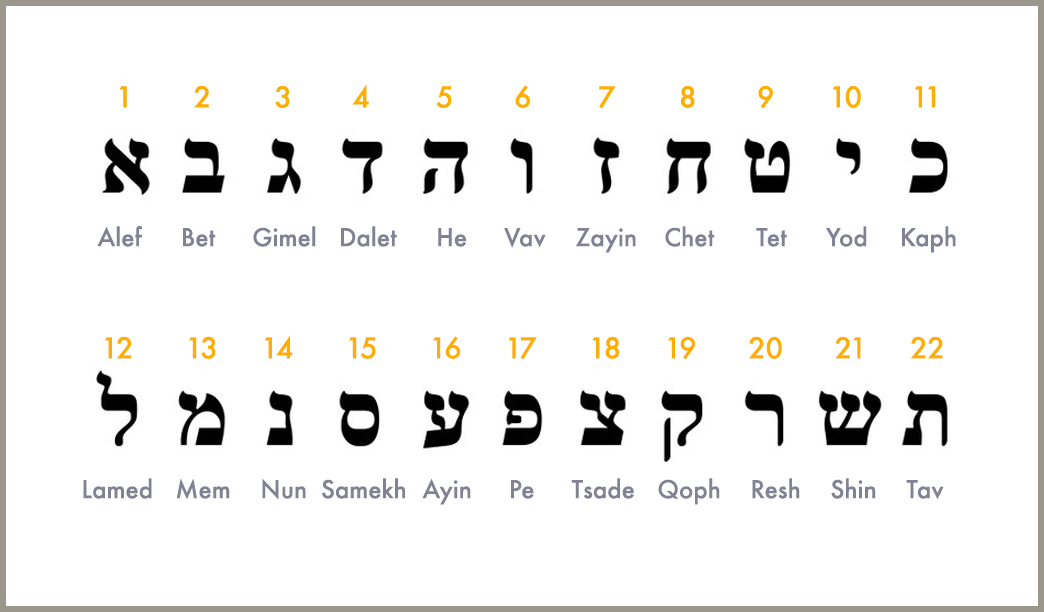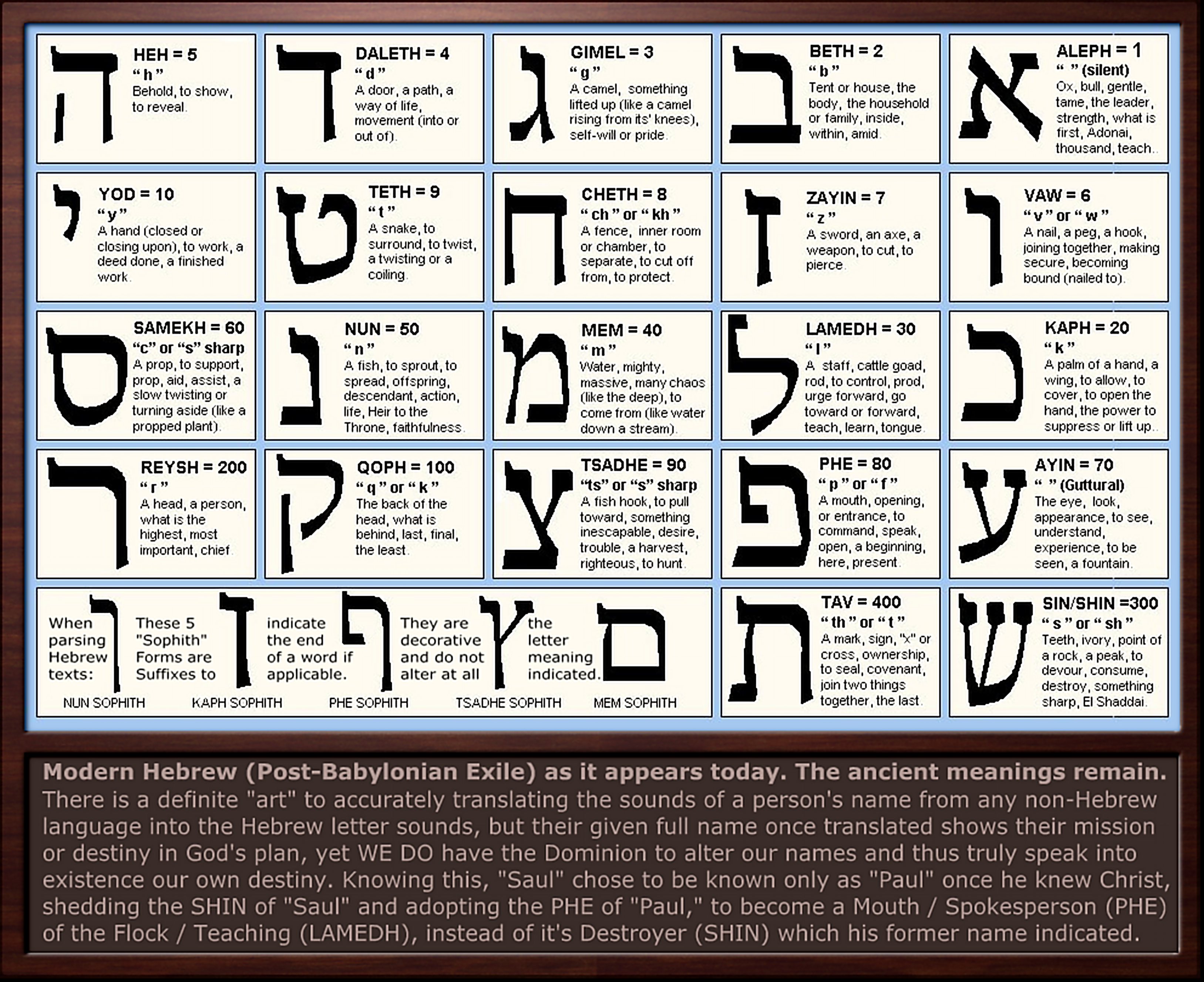Hebrew Letters Numbers
Hebrew Letters Numbers - Web in hebrew every letter has a numerical value. For other uses western (arabic) numerals (1, 2, 3, etc) are used. The first 10 letters (aleph to yud) each correspond to a number, one through ten. Web hebrew letters are used to a limited extent to represent numbers, mainly on calendars. The hebrew language has names for common numbers that range from zero to one million. Web each letter represents a number. Letters of the hebrew alphabet are used to represent numbers in a few traditional contexts, such as in calendars. The next nine letters (khaf to kuf) represent 20 through 100, and the final three letters (. Cardinal and ordinal numbers must agree in gender with the noun they.
Letters of the hebrew alphabet are used to represent numbers in a few traditional contexts, such as in calendars. Web in hebrew every letter has a numerical value. Web each letter represents a number. The first 10 letters (aleph to yud) each correspond to a number, one through ten. For other uses western (arabic) numerals (1, 2, 3, etc) are used. The next nine letters (khaf to kuf) represent 20 through 100, and the final three letters (. Cardinal and ordinal numbers must agree in gender with the noun they. Web hebrew letters are used to a limited extent to represent numbers, mainly on calendars. The hebrew language has names for common numbers that range from zero to one million.
The next nine letters (khaf to kuf) represent 20 through 100, and the final three letters (. Web hebrew letters are used to a limited extent to represent numbers, mainly on calendars. The hebrew language has names for common numbers that range from zero to one million. Cardinal and ordinal numbers must agree in gender with the noun they. Web each letter represents a number. Letters of the hebrew alphabet are used to represent numbers in a few traditional contexts, such as in calendars. The first 10 letters (aleph to yud) each correspond to a number, one through ten. Web in hebrew every letter has a numerical value. For other uses western (arabic) numerals (1, 2, 3, etc) are used.
What are Yods and where do we find them? Faustina Noire
Web hebrew letters are used to a limited extent to represent numbers, mainly on calendars. Letters of the hebrew alphabet are used to represent numbers in a few traditional contexts, such as in calendars. The next nine letters (khaf to kuf) represent 20 through 100, and the final three letters (. The hebrew language has names for common numbers that.
Hebrew Letters and Numeric Values
The next nine letters (khaf to kuf) represent 20 through 100, and the final three letters (. The hebrew language has names for common numbers that range from zero to one million. Web hebrew letters are used to a limited extent to represent numbers, mainly on calendars. Web each letter represents a number. Letters of the hebrew alphabet are used.
Hebrew Letters And Numbers levelings
The hebrew language has names for common numbers that range from zero to one million. Web hebrew letters are used to a limited extent to represent numbers, mainly on calendars. Web each letter represents a number. Letters of the hebrew alphabet are used to represent numbers in a few traditional contexts, such as in calendars. The first 10 letters (aleph.
Hebrew the Lanuguage of Creation
Letters of the hebrew alphabet are used to represent numbers in a few traditional contexts, such as in calendars. Cardinal and ordinal numbers must agree in gender with the noun they. For other uses western (arabic) numerals (1, 2, 3, etc) are used. Web hebrew letters are used to a limited extent to represent numbers, mainly on calendars. The hebrew.
Hebrew Alphabet Numerical Values / The hebrew alphabet has 22
Cardinal and ordinal numbers must agree in gender with the noun they. Letters of the hebrew alphabet are used to represent numbers in a few traditional contexts, such as in calendars. The first 10 letters (aleph to yud) each correspond to a number, one through ten. For other uses western (arabic) numerals (1, 2, 3, etc) are used. The hebrew.
Embroidery Pattern Software Hebrew Alphabet Numbers Chart These
The first 10 letters (aleph to yud) each correspond to a number, one through ten. Letters of the hebrew alphabet are used to represent numbers in a few traditional contexts, such as in calendars. Cardinal and ordinal numbers must agree in gender with the noun they. The next nine letters (khaf to kuf) represent 20 through 100, and the final.
Hebrew Numbers 1130 GRACE in TORAH
The hebrew language has names for common numbers that range from zero to one million. The next nine letters (khaf to kuf) represent 20 through 100, and the final three letters (. Cardinal and ordinal numbers must agree in gender with the noun they. For other uses western (arabic) numerals (1, 2, 3, etc) are used. The first 10 letters.
Hebrew Printables Printable Word Searches
Web hebrew letters are used to a limited extent to represent numbers, mainly on calendars. For other uses western (arabic) numerals (1, 2, 3, etc) are used. Web each letter represents a number. The next nine letters (khaf to kuf) represent 20 through 100, and the final three letters (. Letters of the hebrew alphabet are used to represent numbers.
Hebrew Letter Meanings Chart by Sum1Good on DeviantArt
For other uses western (arabic) numerals (1, 2, 3, etc) are used. Web hebrew letters are used to a limited extent to represent numbers, mainly on calendars. Cardinal and ordinal numbers must agree in gender with the noun they. The next nine letters (khaf to kuf) represent 20 through 100, and the final three letters (. Letters of the hebrew.
“The Creation Of Time From Its Creator”
Web hebrew letters are used to a limited extent to represent numbers, mainly on calendars. Web in hebrew every letter has a numerical value. Letters of the hebrew alphabet are used to represent numbers in a few traditional contexts, such as in calendars. Cardinal and ordinal numbers must agree in gender with the noun they. The hebrew language has names.
Web In Hebrew Every Letter Has A Numerical Value.
Web each letter represents a number. The first 10 letters (aleph to yud) each correspond to a number, one through ten. The hebrew language has names for common numbers that range from zero to one million. For other uses western (arabic) numerals (1, 2, 3, etc) are used.
The Next Nine Letters (Khaf To Kuf) Represent 20 Through 100, And The Final Three Letters (.
Cardinal and ordinal numbers must agree in gender with the noun they. Letters of the hebrew alphabet are used to represent numbers in a few traditional contexts, such as in calendars. Web hebrew letters are used to a limited extent to represent numbers, mainly on calendars.









